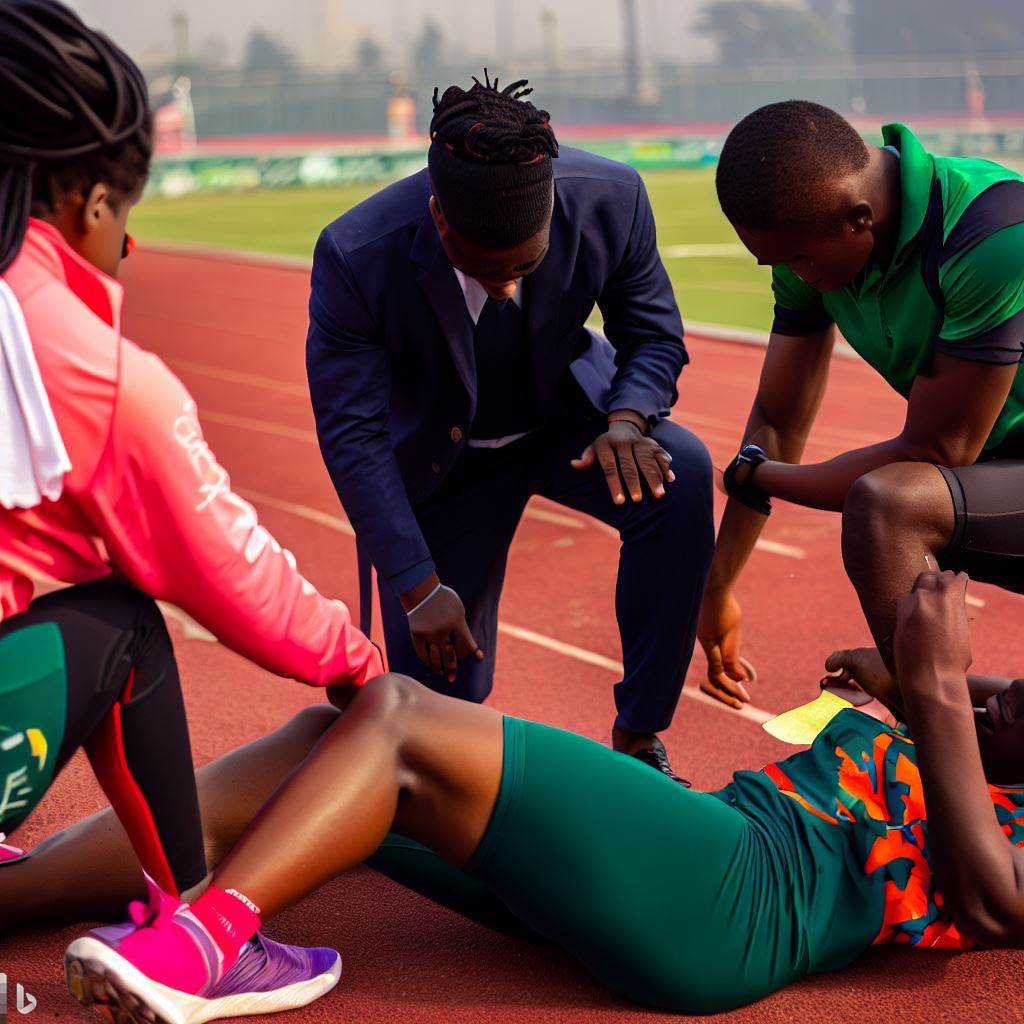Introduction
Athletic trainers are healthcare professionals who specialize in preventing, diagnosing, and treating injuries of athletes.
They play a crucial role in ensuring the well-being of athletes by providing immediate medical care, designing rehabilitation programs, and educating on injury prevention.
Their expertise extends beyond injury management as they are also responsible for enhancing performance and optimizing athletes’ physical conditioning.
In Nigeria, the sports industry has witnessed remarkable growth over the years.
The country boasts a rich sporting culture and has produced remarkable talents in various disciplines.
Football, athletics, basketball, and boxing are some of the most popular sports in Nigeria, with athletes competing both nationally and internationally.
Athletic trainers in Nigeria face unique challenges due to limited resources and access to advanced medical technology.
However, they remain dedicated to their responsibilities of keeping athletes healthy and ensuring their optimal performance.
They work closely with doctors, coaches, and other sports professionals to create a comprehensive approach to athlete care.
Moreover, athletic trainers in Nigeria also contribute to the overall development of sports in the country.
They actively participate in research, education, and policy-making endeavors to improve the understanding of sports injuries and promote the highest standards of care.
Overall, athletic trainers are essential for the welfare and success of athletes in Nigeria.
Their role is critical in preventing, diagnosing, and treating injuries, as well as optimizing performance.
Despite the challenges they face, athletic trainers in Nigeria continue to be dedicated professionals, contributing to the growth of the sports industry and ensuring the well-being of athletes.
Background of Athletic Trainers in Nigeria
History and development of athletic trainers in Nigeria
- Athletic trainers in Nigeria have a rich history dating back several decades.
- Their development can be traced to the establishment of sports teams and clubs in the country.
- In the early years, athletic trainers in Nigeria were primarily volunteers or part-time practitioners.
- As sports became more popular and organized, the demand for professional athletic trainers grew.
- In the 1980s, the Nigerian Association of Athletic Trainers and Therapists (NAATT) was formed.
- This association aimed to regulate the practice of athletic training and ensure professional standards.
- Today, athletic trainers in Nigeria play a vital role in the sports industry, providing healthcare services to athletes.
- They are recognized as important members of sports teams, both at the professional and amateur levels.
- The progress of athletic trainers in Nigeria continues to evolve, with a focus on improving standards and education.
- Nigeria has also produced highly skilled athletic trainers who have made significant contributions to sports medicine.
Training and education requirements for becoming an athletic trainer in Nigeria
- Obtaining a bachelor’s degree in athletic training or related field is the first step.
- Many universities in Nigeria offer undergraduate programs in sports sciences and athletic training.
- These programs provide a comprehensive curriculum that covers both theoretical and practical aspects.
- Students learn anatomy, physiology, sports nutrition, injury prevention, and rehabilitation techniques.
- After completing the undergraduate program, aspiring athletic trainers must undergo clinical training.
- They are required to work under the supervision of experienced athletic trainers or healthcare professionals.
- During this period, trainees gain hands-on experience and develop practical skills.
- Following the completion of clinical training, individuals must pass a certification examination.
- The examination is conducted by the Nigerian Association of Athletic Trainers and Therapists.
- Once certified, athletic trainers can practice independently and provide healthcare services to athletes.
In essence, athletic trainers in Nigeria have a long history and their role has significantly evolved over the years.
Their training and education requirements ensure that they can provide high-quality healthcare services to athletes.
Read: How to Get Certified as an Athletic Trainer in Nigeria
Roles and Responsibilities of Athletic Trainers in Nigeria
By fulfilling these roles and responsibilities, athletic trainers in Nigeria contribute to the overall well-being and performance of athletes.
They play a critical role in injury prevention, ensuring that athletes are physically prepared for their activities through pre-participation physical examinations and educational programs.
In case of injuries, athletic trainers provide immediate care and assess the severity of the injury to determine the appropriate course of action.
The rehabilitation and treatment aspect of an athletic trainer’s role is essential for helping athletes recover from injuries effectively.
By designing and implementing customized rehabilitation programs, athletic trainers facilitate the healing process and prevent further complications.
They also collaborate with other healthcare professionals, such as physical therapists, to create comprehensive treatment plans.
Moreover, athletic trainers are responsible for enhancing athletes’ performance through proper nutrition and conditioning.
By educating athletes on the importance of proper nutrition and hydration, athletic trainers ensure that athletes maintain optimal health and energy levels.
They also implement strength and conditioning programs that focus on improving athletes’ strength, speed, and endurance.
Recordkeeping and documentation are crucial for maintaining accurate and up-to-date medical records of athletes.
This includes keeping track of their medical history, any injuries sustained, and the treatment provided.
By documenting injury assessments, treatment plans, and progress, athletic trainers ensure continuity of care and provide useful information for future reference.
In general, athletic trainers in Nigeria have various essential roles and responsibilities.
They play a significant part in injury prevention, immediate care and assessment, rehabilitation and treatment, performance enhancement, and sports nutrition.
Their recordkeeping and documentation efforts facilitate effective communication and ensure the overall well-being and performance of athletes.
Read: Challenges in the Athletic Trainer Profession in Nigeria

Challenges Faced by Athletic Trainers in Nigeria
In Nigeria, athletic trainers encounter various challenges that hinder their ability to fulfill their roles and responsibilities effectively.
These challenges include:
Lack of recognition and support
- Athletic trainers in Nigeria often struggle with the lack of recognition and support from the government, sports associations, and the general public.
- The profession is not well understood, which leads to a lack of appreciation for the importance of athletic trainers in sports.
- Without recognition and support, athletic trainers face difficulties in advocating for athlete safety and implementing injury prevention strategies.
- They often have to navigate bureaucratic hurdles and lack the necessary resources to provide optimal care for athletes.
Limited financial resources and equipment
- Athletic trainers in Nigeria face significant financial constraints and often struggle to obtain necessary equipment and supplies.
- The lack of financial resources makes it challenging for trainers to adequately assess and manage injuries.
- Without proper equipment, athletic trainers may be unable to effectively rehabilitate athletes or provide appropriate first aid during emergencies.
- They may also have limited access to current treatment modalities and technologies, hindering optimal care for athletes.
Accessibility and availability of quality healthcare facilities
- The limited accessibility and availability of quality healthcare facilities pose a significant challenge for athletic trainers in Nigeria.
- Athletes often have to travel long distances to access specialized healthcare services, delaying timely treatment and rehabilitation.
- The lack of quality healthcare facilities also limits the availability of specialized diagnostics and interventions for sports-related injuries.
- Athletic trainers have to work with limited resources and substandard facilities, compromising the quality of care they can provide.
Despite these challenges, athletic trainers in Nigeria continue to play a crucial role in ensuring the health and well-being of athletes.
They work tirelessly to overcome these obstacles and provide the best possible care with the resources available to them.
Read: Top Athletic Training Schools in Nigeria: A Comprehensive List
Importance of Athletic Trainers in Nigerian Sports Industry
Athletic Trainers play a crucial role in the Nigerian sports industry, contributing to the overall development and success of sports in the country.
Their responsibilities go beyond providing first aid on the field, and their expertise greatly impacts athletes and teams. Let’s explore the importance of athletic trainers in Nigeria:
Enhancing overall athlete well-being and performance
- Athletic trainers are skilled professionals who help athletes maintain optimum health and physical condition.
- They assess and address any factors that may affect an athlete’s performance, such as injuries, fitness level, or nutrition.
- By implementing personalized training programs, they improve athletes’ strength, endurance, and flexibility.
- They also educate athletes on injury prevention techniques, promoting long-term well-being.
Reducing the risk of injuries and their impact on athletes and teams
- Athletic trainers provide pre-activity evaluations to identify potential risk factors and minimize the likelihood of injuries.
- They develop injury prevention strategies, including warm-up routines, proper gear usage, and safe training techniques.
- Their prompt and efficient care during games or practices helps minimize the impact of injuries on athletes and teams.
- They provide immediate diagnosis, treatment, and rehabilitation plans, accelerating athletes’ recovery.
Contributing to the overall development and success of sports in Nigeria
- Athletic trainers assist in talent identification and provide guidance to aspiring athletes.
- By monitoring athletes’ progress and offering expert advice, they help them reach their full potential.
- Adequate injury management by athletic trainers helps athletes avoid long-term physical limitations.
- They contribute to building a strong and competitive sports culture in Nigeria, attracting more participation and investment.
- Athletic trainers also collaborate with other professionals, such as coaches and sports psychologists, to ensure comprehensive support for athletes.
Generally, athletic trainers are of immense importance in the Nigerian sports industry.
Their contributions extend well beyond injury prevention and emergency care.
Through their expertise, they enhance overall athlete well-being, reduce the risk of injuries, and promote the success and development of sports in Nigeria.
Read: Salaries of Athletic Trainers in Nigeria: What to Expect
Conclusion
Athletic trainers in Nigeria play a crucial role in ensuring the well-being and performance of athletes.
They are responsible for preventing, evaluating, and treating sports-related injuries, as well as providing rehabilitation services.
It is evident that their expertise and dedication greatly contribute to the success of Nigerian sports.
It is essential to recognize and appreciate the significant role that athletic trainers play in the industry.
Their knowledge and skills help enhance the overall performance and longevity of athletes, ultimately leading to better achievements in sports.
Furthermore, their efforts contribute to the overall physical and mental well-being of athletes, promoting a healthier sporting community in Nigeria.
Therefore, it is crucial to encourage the recognition and support of athletic trainers in the industry.
This can be done by creating awareness among sports organizations, government bodies, and the public about the indispensable role of athletic trainers.
Adequate funding, training programs, and professional development opportunities should be provided to enhance their capabilities.
Athletic trainers in Nigeria deserve recognition and support for their invaluable contributions to Nigerian sports.
By acknowledging their roles and encouraging their development, we can promote a safer and more productive sports environment in Nigeria.




